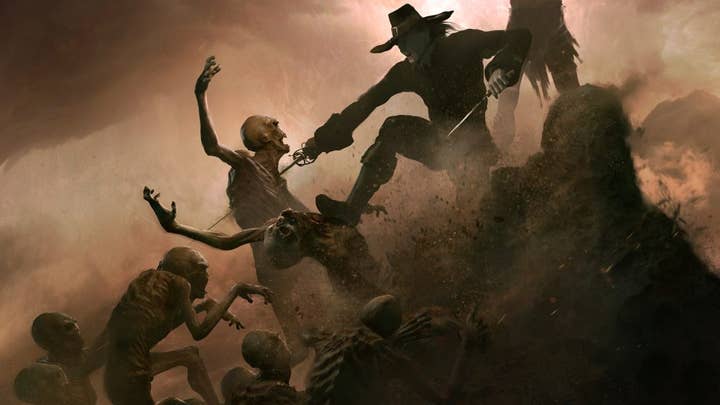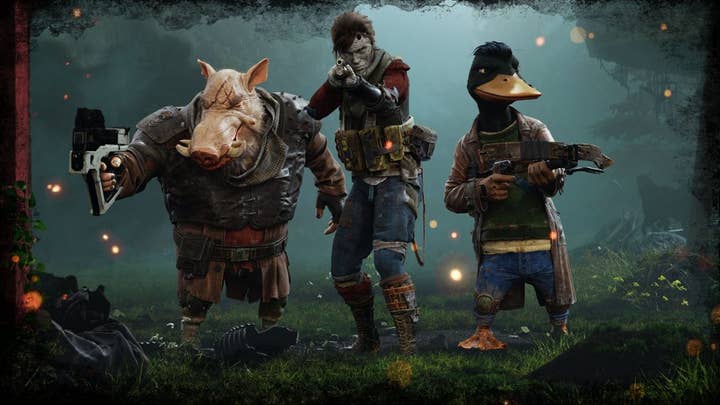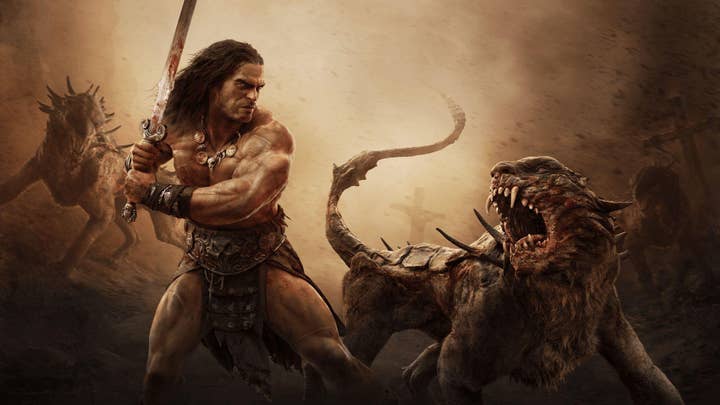Funcom acquires Conan IP holder
CEOs of Conan Exiles developer and Cabinet Group talk about the deal that includes rights to Conan along with Solomon Kane, Mutant Year Zero, and dozens more properties
Conan of Cimmeria is now Conan of Norway, as Funcom today announced the acquisition of Cabinet Group, the IP holding company behind Conan, Solomon Kane, Mutant Year Zero, and dozens of other properties.
Of course, the deal won't actually change the Conan canon about his homeland. Based on our conversation with Funcom CEO Rui Casais and Cabinet Group co-founder and CEO Fredrik Malmberg, it's possible the more noticeable impact may be seen in the rest of the Cabinet properties.
"Conan is the jewel in the crown, but we probably have I'd say 30 to 50 characters that we could exploit," Malmberg says. "We felt we cannot only work through Funcom because they're so busy doing Dune, Conan Exiles, and all their other games."
"It's not just about Conan... the other characters we can bring to life will feel a lot more attention with the backing we have and the ability we have to push them"
Rui Casais
As part of the deal, Cabinet Group will be folded into Heroic Signatures, a joint venture Funcom and Cabinet had set up in 2018 specifically to license the latter's library of IP for video games. Malmberg will serve as president of the outfit and Heroic Signatures will expand its remit and handle licensing for these properties in other media besides games.
"Together we feel like we have a lot more muscle to develop these IPs in the coming years," Casais says. "Of course, IP development takes time. But it's not just about Conan. Conan is extremely important and there's a Netflix TV show in development. But the other characters we can bring to life will feel a lot more attention with the backing we have and the ability we have to push them."

The relationship between Funcom and Cabinet actually goes way back, slightly predating Casais' 17-year tenure with the studio. Malmberg recalls when he first was involved in acquiring the Conan property in 2002.
"There were no active licenses whatsoever," he says. "It was pretty much a dormant IP at that time, and one of the first things I wanted to do -- with my background from gaming, specifically -- was to really build a world around Conan and gamify a lot more than had been done previously."
Funcom was one of the first companies Malmberg reached out to as he was impressed with what the studio had done on its MMO Anarchy Online.
"We were in discussions with a number of companies -- Sony Online [Entertainment] was one -- but Funcom really had the creative team that stood out," Malmberg says. "They really understood that character."
The studio's work on Age of Conan not only produced an enduring success -- not only is the MMO still up and running but Casais says it remains profitable to this day -- but it helped reshape a Conan IP that Malmberg said was "lacking creative cohesiveness" at the time.
"It was a little all over the place, what Conan was," he says. "But we unified that using the Funcom concepts. That became pretty much the image going forward. We went back to the original Robert E. Howard stories and created a more grounded, realistic version of both the world and the characters. I really selected certain companies that had the same view of the characters and the world -- it was Todd McFarlane for the toys, Dark Horse Comics for the comics, and Funcom for the video games, and a couple of others -- that really all shared the same vision."
That vision thrived over the years, and the relationship between the two companies deepened.
"Since 2015, I feel like every year we're working more closely together, and we've been on the same wavelength," Casais says. "Video game developers and video gamers love other products -- merchandise, figures, comic books, board games -- so we felt there was a natural partnership here, and it's crystalized into this right now."
"I think the main hold back for any IP is you're holding back investing too much money in something you do not control or do not own"
Fredrik Malmberg
The pair mention a number of factors that played into the decision to make the partnership permanent, not the least of which was Tencent's acquisition of Funcom last year giving both sides reason to step back and reassess the future of the relationship. Casais says they decided ultimately that they would be stronger together, with Malmberg adding that the deal gives his stable of IP more stability and opportunity in a shifting market for licensed properties.
"I think the main hold back for any IP is you're holding back investing too much money in something you do not control or do not own," Malmberg says. "We can extend to five-year contracts, ten-year contracts, or even a joint company, but ultimately, when you get into these massive investments in IP we're talking about across all media, you want to know that partner is not going to walk away."
He adds, "People really prefer to own their IP and their characters, because that really could represent a huge upside if it's a big hit. That has changed the whole licensing environment, because sure, if you're an owner of a character, you can work with Ubisoft or Fortnite and you drop them in and do a weekend [promotion], but it's not the same thing as doing a whole partnership and getting multiple titles and exposure and developing that world. Gamers are one part of your audience, but it's a very important part because they're so immersed in that universe and if you get credibility there, you can carry it on.
"There's such huge competition that you have to do everything collaboratively now. Even companies that used to be very competitive towards each other are now reaching out"
Fredrik Malmberg
"Fortnite is a great example of where licensing is going, but I don't think it stops there. It's still very attractive for everybody in this challenging marketplace. There's such huge competition that you have to do everything collaboratively now. Even companies that used to be very competitive towards each other are now reaching out. This has happened in Hollywood for years, that you actually co-produce or co-distribute."
Casais thinks Fortnite has pushed a new vision of working with licensed properties in games, but he doesn't think it's going to eliminate the old one.

"We'll see the universes that are focused and the universes that are... I don't want to call them generic, but they are able to co-exist with multiple different styles very easily because they're less immersive. Fortnite is a great example because it's not so much the universe of Fortnite. Fortnite is just a platform for characters. But if you're playing a Batman game, you want to be Batman. You're not going to want Conan in a single-player Batman game. But if you have a game that is Heroes Online, then suddenly it's about heroes and you can have sci-fi heroes, barbarian heroes, etc.
"There will always be a place for the types of games and entertainment that are extremely immersive in one universe, and the types of games where it's less about that and more about the gameplay, the interactions, the coexistence between a diverse cast of characters. I think what we see now is that there are games that have been really popular like Fortnite that are leveraging licensing to keep their own platform fresh. They need to keep using other IPs because their own gameplay, though very captivating, isn't enough. So they need other reasons to capture the attention of players. I think we'll see a bigger focus on IP than before, both on games that are platforms and games that are universes."
While "Heroes Online" seemed to be a hypothetical, Funcom has said it is working on an unannounced game "which will combine many of the characters in the Robert E. Howard universe."
Whatever comes next, it's clear that Funcom and Heroic Signatures are aiming for bigger and better.
"I'm excited about what we can do with these IPs and get more games, more board games, more TV shows, more cool characters into the zeitgeist and people's mindsets," Casais says. "We have some really good material to work with."

